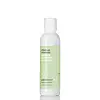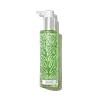What's inside
What's inside
 Key Ingredients
Key Ingredients

 Benefits
Benefits

 Concerns
Concerns

 Ingredients Side-by-side
Ingredients Side-by-side

Aloe Barbadensis Leaf Juice
Skin ConditioningCoco-Glucoside
CleansingDecyl Glucoside
CleansingHelianthus Annuus Seed Oil
EmollientGlycerin
HumectantSodium Cocoyl Glutamate
CleansingLeuconostoc/Radish Root Ferment Filtrate
AntimicrobialSalix Alba Bark Extract
AstringentPopulus Tremuloides Bark Extract
AntiseborrhoeicPersea Gratissima Oil
Skin ConditioningCocos Nucifera Fruit Extract
EmollientCucumis Sativus Fruit Extract
EmollientCamellia Sinensis Leaf Extract
AntimicrobialCitrus Aurantium Bergamia Fruit Extract
Skin ConditioningCitrus Limon Peel Extract
EmollientPyrus Malus Fruit Extract
Skin ConditioningRubus Idaeus Fruit Extract
AstringentSalvia Officinalis Leaf Extract
CleansingVaccinium Macrocarpon Fruit Extract
AstringentRosmarinus Officinalis Leaf Extract
AntimicrobialVanilla Planifolia Fruit Extract
Skin ConditioningLavandula Angustifolia Flower/Leaf/Stem Extract
MaskingSalvia Sclarea Extract
AntiseborrhoeicSorbitan Oleate Decylglucoside Crosspolymer
CleansingTriethyl Citrate
MaskingXanthan Gum
EmulsifyingLactobacillus
Skin ConditioningSodium Anisate
AntimicrobialLevulinic Acid
PerfumingSodium Levulinate
Skin ConditioningCitric Acid
BufferingAloe Barbadensis Leaf Juice, Coco-Glucoside, Decyl Glucoside, Helianthus Annuus Seed Oil, Glycerin, Sodium Cocoyl Glutamate, Leuconostoc/Radish Root Ferment Filtrate, Salix Alba Bark Extract, Populus Tremuloides Bark Extract, Persea Gratissima Oil, Cocos Nucifera Fruit Extract, Cucumis Sativus Fruit Extract, Camellia Sinensis Leaf Extract, Citrus Aurantium Bergamia Fruit Extract, Citrus Limon Peel Extract, Pyrus Malus Fruit Extract, Rubus Idaeus Fruit Extract, Salvia Officinalis Leaf Extract, Vaccinium Macrocarpon Fruit Extract, Rosmarinus Officinalis Leaf Extract, Vanilla Planifolia Fruit Extract, Lavandula Angustifolia Flower/Leaf/Stem Extract, Salvia Sclarea Extract, Sorbitan Oleate Decylglucoside Crosspolymer, Triethyl Citrate, Xanthan Gum, Lactobacillus, Sodium Anisate, Levulinic Acid, Sodium Levulinate, Citric Acid
Water
Skin ConditioningGlycerin
HumectantCocamidopropyl Hydroxysultaine
CleansingSodium Laurylglucosides Hydroxypropylsulfonate
CleansingPolyglyceryl-6 Caprylate
EmulsifyingSclerotium Gum
Emulsion StabilisingSorbitan Oleate Decylglucoside Crosspolymer
CleansingSodium Chloride
MaskingSodium Levulinate
Skin ConditioningCarrageenan
Ananas Sativus Fruit Extract
Skin ConditioningSodium Anisate
AntimicrobialCitric Acid
BufferingMelia Azadirachta Leaf Extract
Skin ConditioningCamellia Sinensis Leaf Extract
AntimicrobialCitrus Aurantium Bergamia Fruit Extract
Skin ConditioningCitrus Limon Peel Extract
EmollientCucumis Sativus Fruit Extract
EmollientLavandula Angustifolia Flower/Leaf/Stem Extract
MaskingTriethyl Citrate
MaskingLactobacillus Ferment
Skin ConditioningMelia Azadirachta Flower Extract
Skin ConditioningPyrus Malus Fruit Extract
Skin ConditioningRosmarinus Officinalis Leaf Extract
AntimicrobialRubus Idaeus Fruit Extract
AstringentSalvia Officinalis Leaf Extract
CleansingSalvia Sclarea Extract
AntiseborrhoeicVaccinium Macrocarpon Fruit Extract
AstringentVanilla Planifolia Fruit Extract
Skin ConditioningTetrasodium Glutamate Diacetate
Aloe Barbadensis Leaf Juice
Skin ConditioningLimonene
PerfumingLinalool
PerfumingWater, Glycerin, Cocamidopropyl Hydroxysultaine, Sodium Laurylglucosides Hydroxypropylsulfonate, Polyglyceryl-6 Caprylate, Sclerotium Gum, Sorbitan Oleate Decylglucoside Crosspolymer, Sodium Chloride, Sodium Levulinate, Carrageenan, Ananas Sativus Fruit Extract, Sodium Anisate, Citric Acid, Melia Azadirachta Leaf Extract, Camellia Sinensis Leaf Extract, Citrus Aurantium Bergamia Fruit Extract, Citrus Limon Peel Extract, Cucumis Sativus Fruit Extract, Lavandula Angustifolia Flower/Leaf/Stem Extract, Triethyl Citrate, Lactobacillus Ferment, Melia Azadirachta Flower Extract, Pyrus Malus Fruit Extract, Rosmarinus Officinalis Leaf Extract, Rubus Idaeus Fruit Extract, Salvia Officinalis Leaf Extract, Salvia Sclarea Extract, Vaccinium Macrocarpon Fruit Extract, Vanilla Planifolia Fruit Extract, Tetrasodium Glutamate Diacetate, Aloe Barbadensis Leaf Juice, Limonene, Linalool
Ingredients Explained
These ingredients are found in both products.
Ingredients higher up in an ingredient list are typically present in a larger amount.
Aloe Barbadensis Leaf Juice comes from leaves of the aloe plant. Aloe Barbadensis Leaf Juice is best known for helping to soothe sunburns. It is also anti-inflammatory, moisturizing, antiseptic, and can help heal wounds.
Aloe is packed with good stuff including Vitamins A, C, and E. These vitamins are antioxidants, which help fight free-radicals and the damage they may cause. Free-radicals are molecules that may damage your skin cells, such as pollution.
Aloe Barbadensis Leaf Juice also contains sugars. These sugars come in the form of monosaccharides and polysaccharides, folic acid, and choline. These sugars are able to help bind moisture to skin.
It also contains minerals such as calcium, 12 anthraquinones, fatty acids, amino acids, and Vitamin B12.
Learn more about Aloe Barbadensis Leaf JuiceCamellia Sinensis Leaf Extract is derived from the leaves of the tea plant. Black tea, green tea, and oolong tea are all harvested from this plant.
This ingredient has many skin benefits:
This ingredient contains polyphenols, a strong antioxidant. Antioxidants help fight off molecules that damage skin cells.
On top of that, the antioxidants in green tea neutralize free-radicals from the sun. This gives the skin some extra UV protection, but should not replace sunscreen.
Many components of tea have anti-inflammatory properties.
Polyphenols and L-theanine help soothe the skin and reduce irritation. The caffeine in Camellia Sinensis Leaf Extract helps calm inflamed blood vessels.
Other compounds found in tea include: Vitamin Bs, linoleic acid, magnesium, calcium, iron, and zinc.
Research has shown both drinking Camellia Sinensis Leaf Tea and applying it to the skin can help boost skin elasticity and hydration. Studies also show using tea extract may reduce sebum, or oil, production.
Learn more about Camellia Sinensis Leaf ExtractCitric Acid is an alpha hydroxy acid (AHA) naturally found in citrus fruits like oranges, lemons, and limes.
Like other AHAs, citric acid can exfoliate skin by breaking down the bonds that hold dead skin cells together. This helps reveal smoother and brighter skin underneath.
However, this exfoliating effect only happens at high concentrations (20%) which can be hard to find in cosmetic products.
Due to this, citric acid is usually included in small amounts as a pH adjuster. This helps keep products slightly more acidic and compatible with skin's natural pH.
In skincare formulas, citric acid can:
While it can provide some skin benefits, research shows lactic acid and glycolic acid are generally more effective and less irritating exfoliants.
Most citric acid used in skincare today is made by fermenting sugars (usually from molasses). This synthetic version is identical to the natural citrus form but easier to stabilize and use in formulations.
Read more about some other popular AHA's here:
Learn more about Citric AcidCitrus Aurantium Bergamia Fruit Extract comes from the bergamot orange.
Bergamot oranges contain antioxidants, dietary fiber, vitamins such as Vitamin C, and minerals.
Citrus Limon Peel Extract is created from the peel of a lemon. Lemon peels contain Vitamin C. Lemon peels also exhibit antibacterial, antioxidant, and antifungal properties.
This extract comes from cucumber. Cucumbers are mostly made up of water (95%), and the other 5% is composed of: vitamin C, caffeic acid, fatty acids, amino acids, and other minerals.
Cucumbers have anti-inflammatory, barrier repair, and hydrating properties.
They contain shikimate dehydrigenase, an enzyme shown to help reduce inflammation and soothe the skin.
The amino acids found in cucumbers help nourish our skin's natural acid mantle (it's an important part of our skin barrier). This slightly acidic film acts as a barrier to protect us from bacteria, viruses, and other contaminants.
Unless you have an allergy to cucumbers, this is generally a non-irritating ingredient.
Fun fact: Cucumis Sativus is native to South Asia and can now be found on every continent.
Learn more about Cucumis Sativus Fruit ExtractGlycerin is already naturally found in your skin. It helps moisturize and protect your skin.
A study from 2016 found glycerin to be more effective as a humectant than AHAs and hyaluronic acid.
As a humectant, it helps the skin stay hydrated by pulling moisture to your skin. The low molecular weight of glycerin allows it to pull moisture into the deeper layers of your skin.
Hydrated skin improves your skin barrier; Your skin barrier helps protect against irritants and bacteria.
Glycerin has also been found to have antimicrobial and antiviral properties. Due to these properties, glycerin is often used in wound and burn treatments.
In cosmetics, glycerin is usually derived from plants such as soybean or palm. However, it can also be sourced from animals, such as tallow or animal fat.
This ingredient is organic, colorless, odorless, and non-toxic.
Glycerin is the name for this ingredient in American English. British English uses Glycerol/Glycerine.
Learn more about GlycerinThis ingredient comes from the lavender plant. It is used to add a scent or mask an unpleasant one in products.
Lavender contains linalool and linalyl acetate.
When exposed to air, these two compounds become strong allergens. This ingredient exhibits cytotoxicity at low concentrations; amounts of 0.25% have been shown to damage skin cells.
Learn more about Lavandula Angustifolia Flower/Leaf/Stem ExtractPyrus Malus Fruit Extract is extract from Apples. Apples are rich in Vitamin C, sugars, and antioxidants.
The sugar in Apples are humectants and help hydrate the skin. On top of that, apples also contain some acids, such as malic acid. These acids may have a mild exfoliating effect.
Last, the phytochemicals found in apples are strong antioxidants. These antioxidants help with anti-aging as they protect your skin cells against oxidative damage.
Learn more about Pyrus Malus Fruit ExtractRosmarinus Officinalis Leaf Extract comes from rosemary. Rosemary is native to the Mediterranean.
While Rosmarinus Officinalis Leaf Oil can be volatile due to its fragrant properties, the fragrance components are usually removed in the leaf extract.
Rosemary Leaf Extract contains many antioxidants such as rosmarinic acid and caffeic acid. Rosemarinic acid, a compound found in rosemary leaf, has been found to help soothe skin conditions such as eczema and acne.
Learn more about Rosmarinus Officinalis Leaf ExtractWe don't have a description for Rubus Idaeus Fruit Extract yet.
Sage leaf extract is a culinary and medicinal herb with antibacterial, antioxidant, and soothing properties.
This ingredient is made up of 75-90% ursolic acid, a potent antioxidant and anti-inflammatory compound.
We don't have a description for Salvia Sclarea Extract yet.
Sodium Anisate comes from fennel. It is used as a preservative and to add flavoring.
Sodium Anisate has antimicrobial properties.
Sodium levulinate is the a sodium salt of Levulinic Acid. If dissolved in an aqueous solution, the two ingredients become identical.
It is a skin conditioning agent, meaning it helps soften and hydrate your skin.
According to Cosmetic Ingredient Review, the highest amounts of sodium levulinate are found in mouthwashes at 0.62%.
Learn more about Sodium LevulinateSorbitan Oleate Decylglucoside Crosspolymer is also known as Poly Suga®Mulse D9 (We'll call is SODC for short).
SODC is a nonionic fragrance solubilizer. A solubilizer blends small amounts of oils into water-based formulas. It is especially good at solubilizing fragrances in water-only systems.
SODC does not contain PEGs. It is hydrophilic, meaning it has the tendency to mix with water.
In products, SODC acts as an emulsifer by blending waters and oils.
Learn more about Sorbitan Oleate Decylglucoside CrosspolymerTriethyl Citrate comes from citric acid. It has masking, perfuming, and solvent properties. As a solvent, this ingredient helps disperse ingredients evenly in skincare.
One manufacturer claims this ingredient can:
According to perfume manufacturers, this ingredient is almost odorless but has a mild fruity, wine and plum scent. It can be used to mask the scent of other ingredients.
This ingredient can be plant-sourced or synthetic; it can naturally be found in cabbage and white wine.
Learn more about Triethyl CitrateVaccinium Macrocarpon Fruit Extract comes from the cranberry fruit. Vaccinium Macrocarpon is the North American species of cranberries native to eastern Canada.
As an astringent, cranberry extract helps tighten the pores by constricting the cells.
Cranberries contain Vitamin E and Vitamin C, both potent antioxidants. It also contains minerals such as manganese and copper.
Learn more about Vaccinium Macrocarpon Fruit ExtractVanilla Planifolia Fruit Extract comes from the vanilla orchid native to central America. It is a skin-soothing ingredient.
This ingredient is skin-soothing and contains polyphenols that give it antioxidant properties.
This ingredient is not known to sensitize or irritate skin (unlike Vanilla Tahitensis). Vanilla tahitensis has shown to irritate skin in low amounts.
Learn more about Vanilla Planifolia Fruit Extract